
CHASQUI-REVISTA DE LITERATURA LATINOAMERICANA
metrics 2024
Engaging with the Complexities of Latin American Literary Heritage
Introduction
CHASQUI-REVISTA DE LITERATURA LATINOAMERICANA is an esteemed academic journal published by Arizona State University, dedicated to the exploration and dissemination of research in the fields of Literature and Literary Theory and Cultural Studies. With an ISSN of 0145-8973 and an E-ISSN of 2327-4247, the journal serves as a critical platform for scholars examining the complexities of Latin American literature from diverse perspectives. Notably ranked in the second quartile in its field as of 2023, CHASQUI reflects its commitment to quality and impactful scholarship. The journal operates within a two-year converged publication cycle, ensuring it remains at the forefront of contemporary discussions and innovations in its disciplines. Although there are no open access options, researchers and students alike will find valuable insights within its pages, bolstered by a robust academic community. Through its dedication to fostering literary scholarship, CHASQUI plays an integral role in advancing the understanding of Latin American narratives and cultural expressions.
Metrics 2024
 0.12
0.12 0.10
0.10 0.10
0.10 7
7Metrics History
Rank 2024
Scopus
JCI (Web Of Science)
Quartile History
Similar Journals
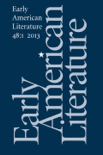
EARLY AMERICAN LITERATURE
Exploring the Roots of American Literary HeritageEARLY AMERICAN LITERATURE, published by the University of North Carolina Press, stands as a pivotal journal in the field of American literary studies. With an ISSN of 0012-8163 and E-ISSN of 1534-147X, this journal invites scholarly discourse and analysis of literary works from the early American period, effectively bridging historical context and contemporary literary theory. The journal has maintained a consistent publication history since 1973, with significant converged years, providing essential insights for researchers and students alike. Ranked Q3 in Literature and Literary Theory with an impressive Scopus rank placing it in the 66th percentile, EARLY AMERICAN LITERATURE remains an essential resource for exploring the intricacies of early American texts and their implications. Although not an open-access journal, its contributions are invaluable for anyone engaging with this rich literary tradition, fostering a deeper understanding of America's cultural and literary heritage.

REVIEW-LITERATURE AND ARTS OF THE AMERICAS
Advancing Conversations on Literature and the Arts.REVIEW-LITERATURE AND ARTS OF THE AMERICAS, published by Routledge Journals, Taylor & Francis Ltd, serves as a vital platform for the exploration of literary and artistic expressions across the Americas. With an ISSN of 0890-5762 and an E-ISSN of 1743-0666, this journal has been dedicated to fostering scholarly discussion since its inception in 1968, addressing interdisciplinary themes that span literature, visual arts, and performing arts. Despite its current Q4 rankings in both Literature and Literary Theory as well as Visual Arts and Performing Arts, the journal remains committed to elevating critical discourse and offering a nurturing environment for emerging voices in the field. Access to the journal is through subscription, highlighting its focused audience of researchers, professionals, and students who seek to deepen their understanding of the cultural dynamics of the Americas. By engaging with diverse scholarly perspectives, REVIEW-LITERATURE AND ARTS OF THE AMERICAS aims to contribute to the ongoing dialogue about the significance of art and literature in societal contexts, making it an important resource for anyone interested in this rich and vibrant area of study.
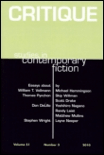
CRITIQUE-STUDIES IN CONTEMPORARY FICTION
Engaging with the Pulse of Contemporary LiteratureCRITIQUE: STUDIES IN CONTEMPORARY FICTION is a premier scholarly journal published by Routledge Journals, Taylor & Francis Ltd, dedicated to advancing our understanding of contemporary fiction within the broader spectrum of literature and literary theory. With an esteemed reputation in the academic community, this journal has achieved a remarkable impact factor and ranks in the Q1 category in Literature and Literary Theory, showcasing its influence and credibility, as reflected in its Scopus Rank of #142 out of 1,106 and a notable 87th percentile. The journal invites researchers, scholars, and students to engage with innovative perspectives, critical analysis, and interdisciplinary exploration of contemporary narratives. Published continuously since 1956, CRITIQUE serves as a vital resource for those seeking to understand the complexities of modern literature, and it remains committed to fostering dialogue around diverse textual and cultural contexts.

Taller de Letras
Connecting Scholars through Literary ExplorationTaller de Letras is a renowned academic journal published by the Pontificia Universidad Católica de Chile, specifically from the Faculty of Letters. With an ISSN of 0716-0798, this journal holds a significant position in the field of Literature and Literary Theory, enjoying a commendable Q2 quartile ranking as of 2023. It operates under the auspices of a prestigious institution, promoting high-quality scholarly discourse within its scope, which spans a wide array of literary studies. Although the journal does not offer Open Access, its contributions are pivotal for researchers, professionals, and students seeking to enhance their understanding of contemporary literary trends and theories, establishing a critical dialogue within the literary community. With coverage extending through a converged lifespan from 2011 to 2024, Taller de Letras continues to be a valuable resource for those engaged in the vibrant fields of literature and criticism.
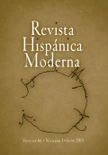
Revista Hispanica Moderna
Navigating the Complexities of Hispanic Literary TraditionsRevista Hispanica Moderna, published by University of Pennsylvania Press, is a scholarly journal dedicated to exploring the rich tapestry of Hispanic cultural, historical, and literary studies. With an ISSN of 0034-9593 and an E-ISSN of 1944-6446, this esteemed publication operates within the United States, ensuring a broad international reach. While it currently does not offer Open Access, the journal provides significant insights across diverse fields, categorized as Q4 in Cultural Studies, History, and Literature and Literary Theory as per the 2023 standards. Although the journal ranks in the lower quartiles of its fields, its systematic approach to modern Hispanic studies offers valuable opportunities for gaining perspectives that are often underrepresented. Researchers, professionals, and students are encouraged to engage with its content as it navigates the complexities of cultural identities and historical narratives from 2019 to 2024 and beyond, making important contributions to the ongoing discourse in the humanities.

Expressions maghrebines
Exploring the Rich Tapestry of Maghreb LiteratureExpressions maghrebines, an esteemed journal published by Florida State University, fosters scholarly dialogue in the realm of Literature and Literary Theory, focusing on the vibrant narratives and critical discourses emerging from the Maghreb region. Established in 2002, this journal has become a vital resource for researchers, professionals, and students, illustrating a commitment to exploring contemporary trends in Francophone literature. With an impressive Q3 rank in 2023, it stands within the top echelon of its category, offering insightful analyses and innovative perspectives to enhance academic understanding. Though not an open-access publication, Expressions maghrebines is indispensable for those seeking to delve into the cultural and intellectual currents that shape Maghreb literary landscapes, thus reinforcing its position as a significant contributor to the academic community's exploration of Francophone studies.

Anclajes
Diving into the Dynamics of Human ExpressionAnclajes is a prominent academic journal dedicated to the fields of Cultural Studies, Linguistics, and Literature, published by the UNIV NACIONAL LA PAMPA, FAC CIENCIAS HUMANAS. With both print (ISSN 0329-3807) and electronic (E-ISSN 1851-4669) formats, the journal has embraced an Open Access model since 2010, greatly enhancing its accessibility and reach to a global audience. Based in Argentina, Anclajes provides a platform for innovative research and critical discourse, contributing significantly to the understanding of cultural phenomena and literary theories. In recent years, the journal has established itself with a Scopus rank placing it in the top 30% of Literature and Literary Theory and the top 57% of Cultural Studies, as indicated by its quartile rankings for 2023. With issues converging from 2012 to 2024, Anclajes continues to foster scholarly communication and serves as an essential resource for researchers, students, and professionals seeking to explore the dynamism of human culture and expression.

REVISTA CHILENA DE LITERATURA
Elevating the conversation in contemporary literature.REVISTA CHILENA DE LITERATURA, published by Universidad de Chile, Facultad de Filosofía y Humanidades, is a premier open-access journal that has been at the forefront of literary scholarship since its inception in 2004. With its ISSN 0718-2295, the journal focuses on a wide array of topics within the field of literature and literary theory, striving to foster intellectual discourse and innovation. It has gained notable recognition, reflected in its Q2 category ranking in 2023, positioning it among the top journals in its field within the Scopus database, where it ranks #513 out of 1106 journals, placing it in the 53rd percentile. Hailing from Chile, the journal also serves as a vital platform for researchers and students to disseminate their work, enhancing the global dialogue in literature. With a history of convergence from 2007 to 2023, REVISTA CHILENA DE LITERATURA is committed to advancing literary research and its implications in contemporary contexts, making it an essential resource for anyone engaged in literary studies.
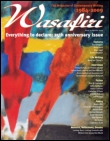
Wasafiri
Advancing critical insights in global discourse.Wasafiri, published by Routledge Journals, Taylor & Francis Ltd, stands as a pivotal platform in the fields of Cultural Studies and Literature and Literary Theory. With a proud publication history extending from 1984 to 2024, this esteemed journal delivers critical insights and cutting-edge research that explore the intersections of culture, literature, and global discourse. Renowned for its academic rigor, Wasafiri holds a Q3 ranking in both its categories as of 2023, showcasing its solid contributions to the scholarly community, reflected in its respectable Scopus rankings—evidencing its relevance and authority, particularly in the literature field. While available through subscription, the journal emphasizes the dissemination of diverse voices and innovative scholarship, appealing to researchers, professionals, and students eager to deepen their understanding of contemporary cultural narratives. Positioned in the United Kingdom, Wasafiri continues to foster vibrant dialogues that challenge conventional paradigms, making it an invaluable resource for anyone engaged in the humanities.
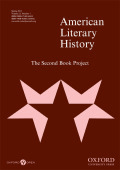
AMERICAN LITERARY HISTORY
Connecting Literature to Cultural and Historical NarrativesAMERICAN LITERARY HISTORY, published by Oxford University Press Inc, is a leading peer-reviewed journal dedicated to advancing the understanding of American literature within the broader contexts of cultural studies and history. With an impressive impact factor reflecting its Q1 ranking in Cultural Studies, History, and Literature and Literary Theory, this journal serves as an essential resource for researchers, professionals, and students alike. Covering a wide range of topics, it seeks to illuminate the historical and cultural dynamics that shape literary production in the United States from 1989 to 2024. Although not an open access journal, AMERICAN LITERARY HISTORY remains a pivotal platform for scholarly discourse, encouraging rigorous scholarship and critical engagement with literary texts. The journal's strong Scopus rankings further emphasize its significance, ranked among the top journals in its field, making it an indispensable tool for anyone seeking to explore the rich tapestry of American literary heritage.